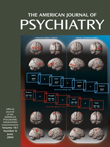To the Editor: We read with interest the meta-analysis of the association between the COMT gene Val158/Met108 polymorphism and schizophrenia. Dr. Glatt et al. concluded that the Val allele of this COMT polymorphism may increase susceptibility to schizophrenia. This association was perhaps more evident in the European sample than in the Asian sample; the patients’ ancestry thus contributed to the considerable variance in the results of the studies. We would like to suggest that there are at least two other factors contributing to the variance of the results of such studies: patients’ gender and the severity of their illness.
The effects of the COMT gene disruption in mice show clear sexual dimorphism
(1). The two family-based studies (one European, one Asian) providing the most persuasive support for the Val association with schizophrenia
(2,
3) used preponderantly male subjects. However, a large Asian case-control study providing support for the association of schizophrenia with the Met allele contained only 43% men
(4). More recently, a large case-control study demonstrated a significant association of the Val allele with schizophrenia in men but not in women
(5). Collectively, these findings indicate that the association between the Val allele and schizophrenia may be sexually dimorphic.
Dr. Glatt et al. did suggest that the patients involved in family-based studies may show less severe pathology than those in case-control studies (p. 474); this difference may have contributed to what they saw as a stronger support of the Val association with schizophrenia in the family-based studies. Indeed, one of the positive family-based studies recruited a relatively high-functioning sample showing a mixture of diagnoses in addition to schizophrenia
(2), suggestive of a lower symptom severity. The other positive family-based study
(3) included first-episode subjects (the lower limit of the range of illness duration was 1 month), implying less severe symptoms and a higher level of functioning. However, a study that found an association of schizophrenia with the Met allele recruited a completely different population of older hospitalized patients, implying a more severe long-term illness
(4). The Met allele was associated with greater severity of schizophrenia symptoms and more frequent hospitalizations in another sample
(6). Similarly, a failure to respond to antipsychotic treatment was associated with the Met allele
(7). Thus, divergent findings of the association between schizophrenia and the COMT polymorphism may be explained, in part, by different levels of illness severity and treatment responsiveness across samples. Perhaps the Val allele is associated with less severe forms of schizophrenia, and the opposite may be true for the Met allele.

